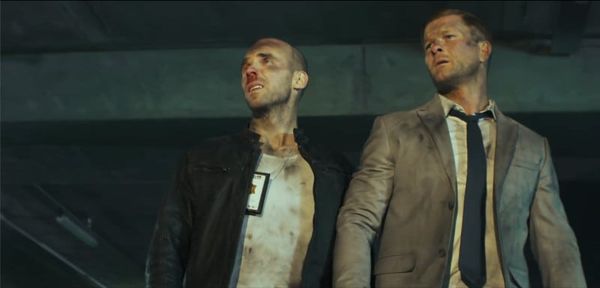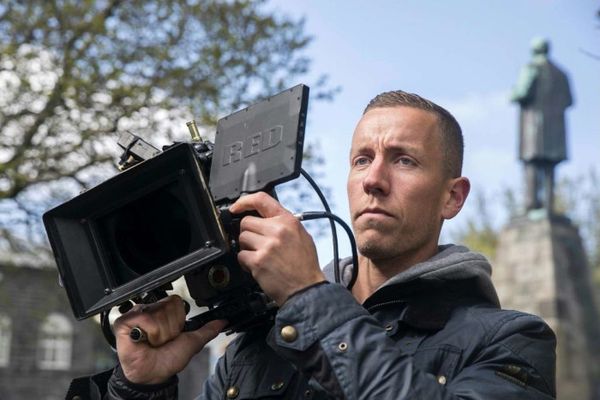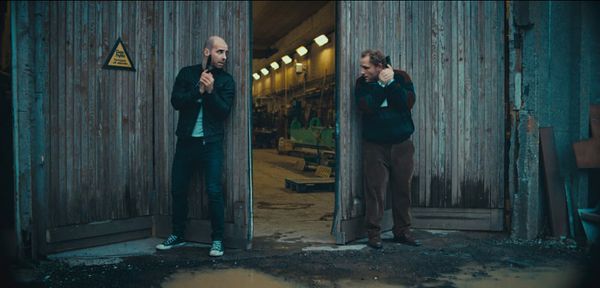Iceland goalie Hannes Þór Halldórsson moves from saving goals to shooting movies with his debut feature Cop Secret. The tale follows cops Bussi (Auðunn Blöndal) and Hörthur (Egill Einarsson), who might not be quite as mismatched as they first appear. While they're grappling with their personal life, they're also trying to get to the bottom of a series of bank raids masterminded by Rikki Ferrari (Björn Hlynur Haraldsson), in which nothing appears to have gone missing.
We caught up with Halldórsson ahead of the film's London Film Festival premiere.
Amber Wilkinson: After 10 years in the planning and making, how does it feel to be finally bringing your film to festivals and cinemas?
Hannes Þór Halldórsson: It's been in a long, long time in the making. Ten years ago, there was a lot of heat around it in Iceland, the ball was rolling and we thought we were going to do it and then some things changed. I became a professional football player in 2013 and played abroad for six years. The guys acting in the movie, at that time, had already been on top of their game, being the most popular comedians and TV hosts in Iceland for a long time. So I kind of thought, especially since I was playing abroad for quite some time, that they wouldn't be as relevant when I came back, maybe. But they managed to stay on top of their game and, you know, were as popular as ever when I came back and so we sat down and started saying should we bring this up again, is this still something that is relevant and that people would be excited for?
And we thought, "Yes", and so we rewrote it - it had to be updated because a lot of things have happened since 2011. And I'm super happy that we did. We also discussed if it shouldn't be a TV series maybe but we all had this feeling. I wanted to make my first feature movie, the guys hadn't made a movie before and this felt like a movie. So we just wanted to make a movie and, you know, have the poster and trailer and everything. So we went for that.
AW: The role of gender politics in this film is pretty crucial. Not just because obviously there's a potential gay romance, but also the way that you use the female football team rather than the male one. It seems you wanted to play around with audience expectations regarding gender roles?
HTH: Yes. It was a conscious decision and it has some levels. First of all, this is a male heavy movie, with the two lead characters being already male and the main villain. The leads had this comedy show, and they decided to have this competition with two trailers over which one would be better and we went for this super cop in denial, he was struggling with his personal life. Our trailer came out on top and was really popular and people wanted to see that movie so we already had these two guys attached to it, plus the villain. So we felt we had to get a gender balance. We felt that we had to get in as many strong female characters as we could. So we brought in the chief of police (Steinunn Ólína Þorsteinsdóttir) and Rikki's sort of right-hand woman (Vivian Ólafsdóttir).
AW: Football is famous for being a very closeted situation for a lot of people, who aren't perhaps able to fully express their sexuality. You only need to look around the world, there are no virtually no 'out' gay footballers.
HTH: That's why, even though our original intention was to make a movie as entertaining as possible for the Icelandic locals, during the development, I think that we felt that we had to make it a bit more interesting, a bit more deep touching on some issues so it would leave something behind. We really tried to treat the subject with respect and to make it the soul of the movie.
I think football and women's football is a good representation of that, because, number one, we are showing a full stadium where the women's football team is playing, which is something that we would love to see. And what you mentioned about sexuality and all that. I think maybe one of the important issues that this movie can shine a light on is that even though we have come far in these issues, football is maybe the best example of them all, that we have not come far enough. I know football very well from my other profession, and seeing that, like you say, nobody has come out in the football world is just telling us that something is not right. If our movie can somehow leave something positive behind or raise important discussions about that and help matters move forward, that would make me very happy.
It's portrayed in a light and humorous way, and it's taking this macho stereotypical character and giving him an interesting twist. And in some ways, it's going to be humorous, but it also has, I think, a good message. We really wanted to portray that not like we were making fun of anything, but having this as the heart and soul of the movie. This is really the struggle of a guy who needs to deal with his emotions. And he really has a problem with it because of his role in society and what people expect of him as a tough supercop.
AW: It's a very ambitious film as well for a first film. It's not like you just went and made a domestic drama where you just needed a house and a few sheep or whatever. You took on a really big idea here, that idea of using the kind of Hollywood traditions but putting them in Iceland.
HTH: I think if I develop my career and become a filmmaker who makes more movies, my movies are going to be more in line with what you see from Hollywood, but you don't necessarily see it a lot in Iceland. So in a way, it's original in Iceland. Even though Hollywood movies are maybe not always the most original, these are the movies that are at the back of my mind. Hollywood is where the money is at and it's like the Champions League of movies, that's where the talent goes, even though not everything is great, but when Hollywood makes it right, it's amazing. So this is probably where my career will go and this project was, for me, the perfect one to start with, because this is the kind of movie that makes me tick, and the movies that I have the easiest access to in my brain, because I've seen a lot of these films. Because it's a comedy, it's a movie where you can make mistakes. It's okay, if the plot has some holes in it, or if some acting is not perfect or something. It's a very good first step for me into the film business because I have excuses for everything.
AW: Amber Wilkinson: It sounds like the car chase must have been really difficult to shoot because the lads were saying that you didn't close the roads for that. So you were shooting, presumably, while other people were just going about their business.
HTH: Yeah, that's right. I was not even taking time off from my football training while shooting the scene. I mean, we started on a Saturday at seven o'clock. And at 11.15, I had football training. So from seven until like 10.30, we did a lot of runs through the city and then I had to go to football training. Then I came back at one o'clock and during that time, they had lunch and they shot a few things. So we are doing this during the traffic, trying to choose the moments where the traffic was not so heavy, you can see the movie, there are not a lot of cars during that scene. And so that's the way we had to do it. I mean, I said somewhere the budget for this movie is 0.03% of the latest Fast And Furious movie.
I think that because this is such a super-low budget movie, we are trying to extract as much as we can out of it and make it look as big as possible. We had to try to be creative in every way to try to squeeze everything out of it. And what you mentioned is one example. You know, how do you make something look fast, even though we're not driving fast? How do you make scenes that are nothing special look big with drone shots, and then you have to use music, you have to use editing. There are some things that you can do that look exactly the same in Iceland, as in Hollywood. You can have fistfights, you can have people running, but we don't have the budget to do big VFX spectacles or stuff like that. So we have to be creative. I think my editing - am I allowed to say skills? - were helpful. I always edited my own stuff myself. S, so I edited all the action sequences myself, for example, the car chase, I was editing it in the hotel during the preparation for playing England in the nation's league last October. A game which we lost 1-0.
But the point is to make these things work. I always remember one interview or a DVD commentary from the Back to the Future movies where Robert Zemeckis said to his composer, "Look, I have a very big movie in my mind, but I don't have the money to make it as big as I want. I need to make it bigger for me". He had some set pieces that were big, but not like he wanted and actually Back To The Future is a small movie, if you think about it, it's not very grand. But he asked the composer to make it as grand as possible. And if you think about that, the Back To The Future score, it feels like an epic movie. And I asked my composer to do the same thing, can you make this tiny movie that we have as big as possible with the score, and I think he did an amazing job.
AW: I gather that Covid had an impact on the Chinatown scene, reducing the number of people you could have in the scene by a lot.
HTH: That was extremely frustrating because we had already paid for some extras. That was supposed to be one of the big scenes of the movie and it was killing me not to be able to use them. So we had to be creative there and try to make it as big as we could and use the circumstances that we had. Since you mentioned Covid, that was also one of the elements that made this process extremely stressful because we were making it during my football season. We had six days of exterior shooting and we had to do that in September while I was still playing for the Icelandic football team. And we won the league so we were playing for the title and the schedules were always moving because of Covid. You could have a game postponed and it would be moved to a day where we had planned to shoot and then you have to rely on the weather in Iceland at the end of September, which is also a nightmare. So it was a stressful time and then we had all the interior shoot done after my football season, for 15 days or something like that. To get this movie to the place where it is it took a lot of effort and a lot of creative thinking from everybody - not just me but everybody in the crew, the actors, composer, the producer, everybody. I'm very very proud of everybody around it because we managed and I think that the soul and the effort comes through.
AW: It hasn't put you off, presumably, you think you'll still make more?
HTH: It was really tough at times but you feel it when people are really into something with a passion, giving it all they have - it squeezes into the movie.The shooting was very tough, but it was also fun.
AW: So do you think you'll have a Cop Secret 2?
HTH: Yeah, I think so. I don't see why not. I hope that people are going to get a normal salary because that was not the case on this one. We are kind of getting our salary now as the experience of going to film festivals getting positive reviews - that's our salary because it wasn't money. So hopefully on the next one, we can make it a bit bigger and people can get their salary in a normal way and we can explore these characters.
- Read what the stars of Cop Secret told us about the film here
























